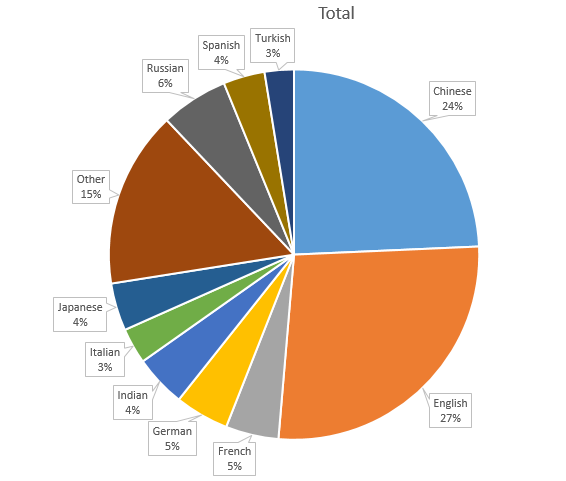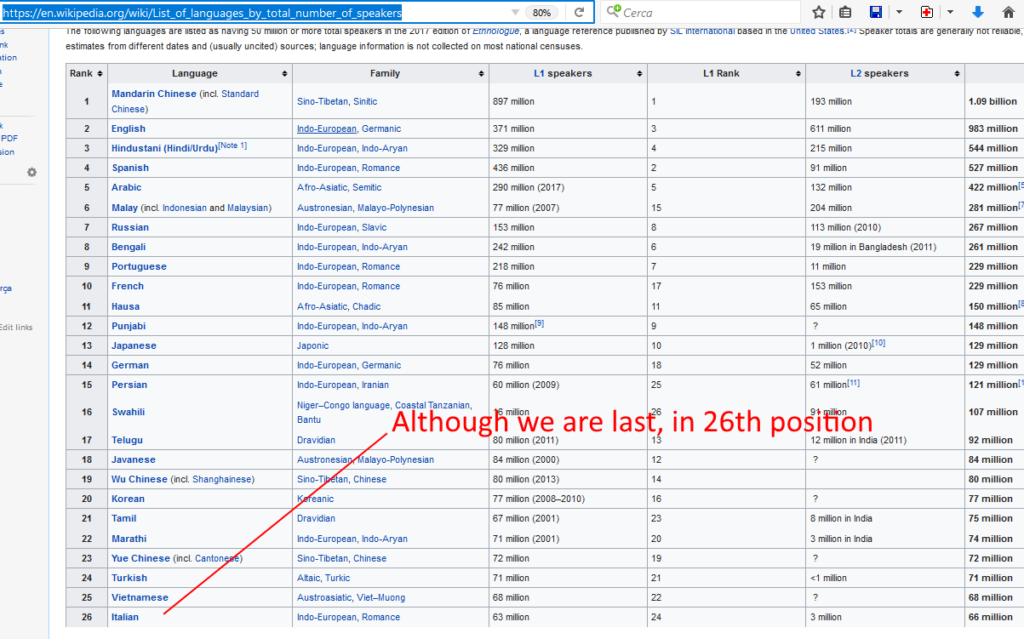For someone, the question doesn’t even apply. I mean, you are from England, from America, from Ireland… you grew up speaking native English, you’ll likely write in that too.
I envy – almost – all of you.
Common mortals like me and – let’s say – around 25% of the rest of the world, speak a language that is spoken by less than 150 million people. It’s still enough of an audience, of course, but other things matter.
I’ll tell you what I took into consideration when choosing the language I write in.
How do I choose which language to write in?
My native language is Italian. My English is actually mostly self-taught and, as such, it’ll never be that good. Never.
I speak other languages too, but when faced with the possibility to become an author, I had mainly two options:
- Italian
- English
And so, I gave a look to the pros and cons of the two.
Italian
Pros:
- It is my native language.
- I know more words than I can even imagine and ever use (no, that’s a joke, there’s always time to learn new words even in your native language)
- I can do most of the editing and proof-reading by myself, or with the help of close friends. I know friends who self-publish and do the entire process by themselves: the books have mistakes, yes, but they are still on a fairly good level of quality.
Cons:
- I write erotica. I actually wrote my first erotic story in Italian and I published it in some specialized forums. I got a good feedback but… looking around in the forums, I could clearly see that Italian people prefer porn over erotica. They want action, soon. They don’t give a fuck about the romance, character building and so on. That means I would write for a niche and the idea didn’t attract me too much.
- Italian is a language spoken by 66 millions people in the world. 1/15th of the English speaking portion.
English
Pros:
- Almost a billion people speak it. A huge, incredible reader-base!
- 2/3rds of that billion speak English as a second language, and that means my readers should not get too angry about the quality and simplicity of my English, right? 😉
- Being it a simple statistical matter, or culture one, there are more people going to like erotica among a billion, than a couple of millions.
Cons:
- I need a native speaker to check everything more than once. It’s not only about grammar, it’s mostly about “how a native would say it” and it’s almost impossible to grasp completely, even if you get very, very good at English. Which I am not.
- I need to extensively use a thesaurus, even to come up with the simplest synonyms sometimes. It’s boring and, moreover…
- …it makes the writing process slower. I can write, in the good days, around 2500 words. I’m sure I could achieve a definitely better quality and quantity in my native language.
So, in the end, I chose English: I traded the difficulty of not using my language with the possibility to get to more readers. When I started to put my tales on Literotica, I realized I had done the right choice (I also realized my English needed to be extensively edited but, that’s something I can’t hide from).

The third “not so hidden” option
You a third option, anyway. You may write in your native language and then have the book translated but… that costs a lot, so it’s usually not what self-publishing authors go for.
Or you may publish in your native language and – if the feedback is good enough – invest the first money in the translation. But nothing can assure you that the book will receive a good feedback in the other language and it also depends a lot on the translator, at that point, especially for fiction books.
This is definitely not my way, for the time being.
The last, big “pro”
Rationality put aside, there is a last, big “Pro” that is, in the end, the most important reason I chose English, and that can be summed up as “imagination”.
If I read a text in Italian I get exactly what it’s written. If I write, I’m able to choose wisely the perfect word to convey the feeling, the description that hits the spot.
And yet this is, in some way, a limitation: when I read – and when I write – I want to use my imagination to interpret the sentences and – sometimes – even the single words.
That’s the whole point. I want to “feel” the language. And I realized I can do that better if I don’t write in my native language.

